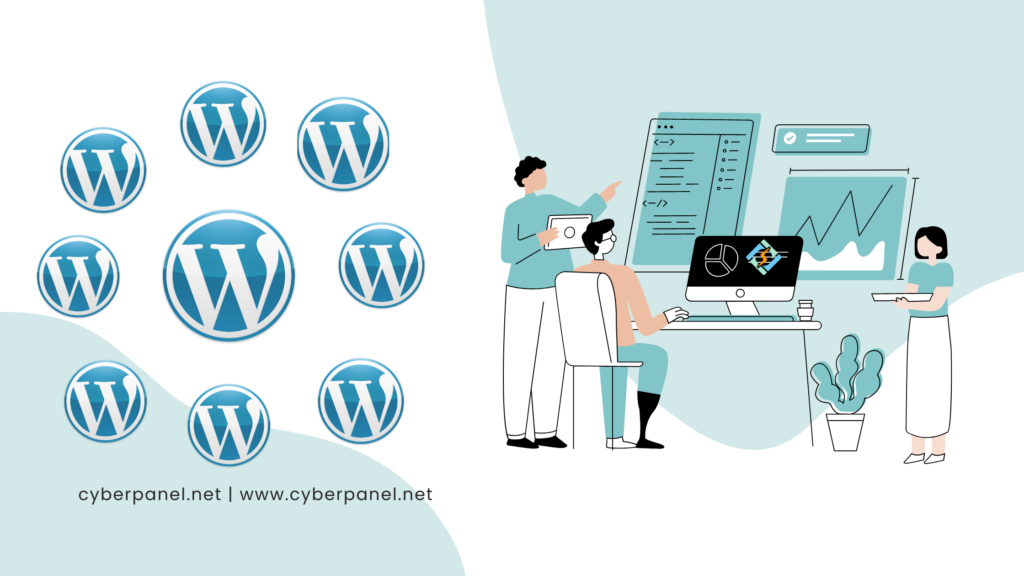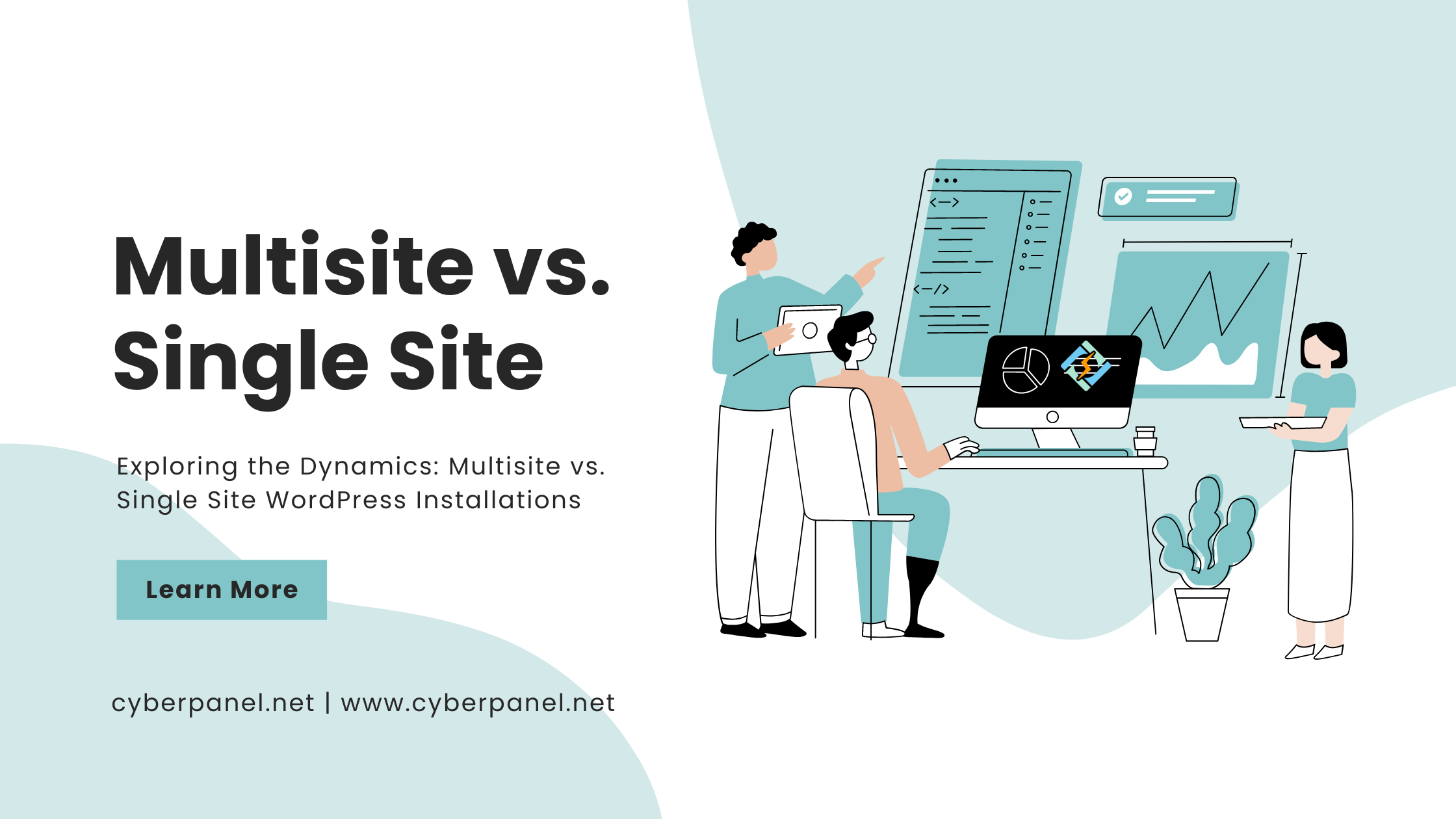Multisite vs. Single Site: WordPress, the popular content management system (CMS), offers users the flexibility to create a single website or manage multiple websites using two distinct installation options: Multisite and Single Site. Each approach has its own set of advantages and considerations, making it crucial for website owners and developers to carefully assess their needs before deciding on the most suitable setup.

1. Understanding Single-Site WordPress
A Single Site WordPress installation is the traditional and straightforward approach. It involves setting up a single instance of WordPress for a single website. This setup is ideal for individuals, small businesses, or anyone looking to maintain a single online presence without the complexity of managing multiple sites from a single dashboard.
Advantages of Single-Site WordPress
- Simplicity and Ease of Use: Single Site installations are easy to set up and manage, making them an excellent choice for beginners or those with less technical expertise.
- Focused Maintenance: With a Single Site, updates, plugins, and themes are specific to that site, allowing for a more focused approach to maintenance.
- Performance: Single Site installations may perform better for smaller websites, as there is no additional overhead associated with managing multiple sites.
Disadvantages of Single-Site WordPress
- Limited Scalability: Single Site installations may face limitations in scalability. As the website grows, it might become challenging to manage increased traffic and content efficiently.
- Separate Management: Each website requires separate management, including updates, plugin installations, and user management. This can become time-consuming when dealing with multiple sites.
- Resource Duplication: Resources, such as themes and plugins, need to be duplicated for each site. This can lead to increased storage usage and potential inconsistencies across multiple sites.
2. Exploring Multisite WordPress
Multisite WordPress, on the other hand, is a feature that enables the management of multiple websites from a single WordPress installation. It is a powerful tool for organizations, large enterprises, or anyone looking to efficiently manage and scale multiple websites.
Advantages of Multisite WordPress
- Centralized Management: Multisite allows administrators to manage multiple websites from a single dashboard, streamlining tasks such as updates, plugin installations, and user management.
- Cost-Efficiency: With Multisite, hosting multiple websites becomes more cost-effective, as it eliminates the need for separate hosting plans for each site.
- Consistent Branding: Multisite ensures consistent branding and design across all websites, making it an excellent choice for organizations with multiple branches or subsidiaries.
- Easy Scalability: Adding new sites to a Multisite network is a seamless process, making it an ideal solution for businesses that anticipate future growth.
Disadvantages of Multisite WordPress
- Complexity in Setup: Setting up a Multisite network is more complex compared to a single-site installation. It requires careful planning and understanding of network configurations.
- Plugin and Theme Compatibility: Not all plugins and themes are compatible with Multisite. Compatibility issues may arise, limiting the choices available for customization.
- Security Concerns: Security vulnerabilities on one site can potentially impact the entire network. A compromise on one site may provide access to others in the Multisite network.
Multisite vs. Single Site WordPress Difference
| Feature | Single Site WordPress | Multisite WordPress |
|---|---|---|
| Installation | Set up for a single website. | Single installation manages multiple sites within a network. |
| Scope and Scale | Ideal for smaller projects. | Efficiently manages multiple websites, suitable for scalability. |
| Administrative Overhead | Lower administrative complexity. | Requires careful planning due to centralized management. |
| Resource Utilization | Generally less resource-intensive. | Can be more resource-intensive, depending on network size. |
| Flexibility | More flexibility for individual sites. | Provides consistency, limiting individual site customizations. |
| Plugin and Theme Compatibility | Broad compatibility with most plugins/themes. | Some plugins/themes may not be compatible with Multisite. |
| Security | Security impact limited to the individual site. | Security vulnerabilities can impact the entire network. |
| Cost Efficiency | Hosting costs associated with individual sites. | Shared resources can lead to cost savings for multiple sites. |
| Centralized Management | Separate dashboards for each site. | Centralized dashboard for managing multiple sites. |
3. Key Considerations for Choosing Between Multisite and Single Site
Scope and Scale
Consider the size and scope of your project. Single Site is ideal for smaller websites, while Multisite is designed for managing multiple websites efficiently.
Administrative Overhead
Multisite installations require more careful planning and administrative oversight. If simplicity is a priority, a Single Site may be the better option.
Resource Utilization
Assess your hosting resources. Multisite can be more resource-intensive, so ensure your hosting plan can accommodate the added demands.
Get exclusive access to all things tech-savvy, and be the first to receive
the latest updates directly in your inbox.
Flexibility
Single Site installations offer more flexibility in terms of customizations for each website. If each site requires unique features or design elements, a Single Site may be more suitable
4. When to Use Each Approach?
- Use Single Site When
- Your project is relatively small and doesn’t foresee significant growth.
- You prefer a straightforward setup and independent management for each website.
- Customization and unique features are crucial for individual websites.
- Use Multisite When
- Managing multiple websites from a centralized dashboard is essential.
- Cost efficiency in terms of shared resources and streamlined management is a priority.
- Consistent branding and design across multiple sites are crucial for your project.
FAQs – Multisite vs. Single Site
Can I migrate from Single-Site to Multisite (or vice versa)?
It is possible, but the process involves careful planning, backups, and potentially adjusting themes and plugins for compatibility.
Is setting up a Multisite installation more complex than a Single Site?
Multisite installations require more careful planning and understanding of network configurations compared to the straightforward setup of a Single Site.
Can I have different domain names for each site in a Multisite network?
Multisite allows you to use different domain names or subdomains for each site within the network.
What is the main difference between Multisite and Single Site WordPress?
Single Site: Involves setting up a single instance of WordPress for a standalone website.
Multisite: Enables the management of multiple websites from a single WordPress installation.
Conclusion
Choosing between Multisite vs. Single Site WordPress installations ultimately depends on the specific needs and goals of the website owner or developer. Both approaches have their merits, and careful consideration of factors such as scope, scalability, and administrative requirements is crucial in making an informed decision. Whether opting for the simplicity of a Single Site or the efficiency of a Multisite network, WordPress provides the tools to create a tailored web presence that aligns with individual or organizational objectives.



